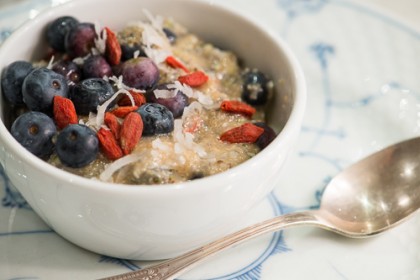A new friend asked me if her three year old’s never formed stool were the result of his apple juice consumption…
“Toddler Diarrhoea: more a nutritional disorder than a disease,” an article in the journal Archives of Disease in Childhood, has some very good information for parents about how fruit juice and low fat diets sometimes play a part in diarrhea. Very low fat diets and clear apple juice can contribute to diarrhea. Here are excerpts from the article:
“In retrospective studies, toddler diarrhoea has been found in children consuming very low fat diets to prevent coronary artery disease, on very high fluid intake, and with high fluid osmolality.
In a randomised trial of children with a recent diagnosis of toddler diarrhoea who were free from symptoms after dietary advice, only reintroduction of normal clear apple juice resulted in the recurrence of diarrhoea; these children could tolerate cloudy apple juice. Cloudy juice is bottled immediately after pressing, whereas clear apple juice is industrially prepared by means of enzymatic treatment of the apple pulp to obtain a higher yield and an attractive clear product. The products therefore differ in the amount of dietary fibre and the amounts of indigestible monosaccharides and oligosaccharides.
In developed countries, the diet of children, especially of infants and toddlers, has changed dramatically over the past years. Paediatricians and other physicians are increasingly consulted not only for toddler diarrhoea but also for other health problems related to these changes. Ready-made products increasingly replace food prepared fully by parents. Here, new nutritional habits originate that go together with an increase in affluence. Drinking plain water is out of vogue. It has largely been replaced by fruit juice and squash. Drinks are consumed on a more or less constant basis, often by a drinking bottle. They provide a high number of calories and may diminish the appetite. Reports from the United States indicate that these mainly carbohydrate containing fluids contribute to unbalanced nutrition. In clinical practice we encounter young children having excess juice consumption as a contributing factor in non-organic failure to thrive. In a cross sectional sample of healthy young children, excess fruit juice consumption was associated with short stature and obesity.Frequently, drinking fruit juice results in a high fluid intake with displacement of fat and fibre from the diet. More parents seem to be concerned with obesity and intend to offer low calorie drinks, not being aware of the fact that, because of its high carbohydrate content, fruit juice equals the caloric content of many popular dairy products.
Fat intake should be increased to at least 35%, even 40%, of total energy intake. Restoration of a pattern with well defined meals and snacks provides the opportunity for significant increases of fibre intake. Fruit juices, in particular clear apple juice, and other squashes should be limited to restore appetite at meal times. Drinks between meals are acceptable, but overconsumption should be discouraged. In almost all patients the efficacy of these dietary measures is such that it may even serve as a confirmation of the diagnosis.It is evident that toddler diarrhoea is worrisome for many parents. It is a condition related to modern affluent societies where new nutritional practices have emerged. Related to these changes clinicians see children with toddler diarrhoea, nutritional deficiencies, and even manifest failure to thrive with stunting. The long term health effects remain uncertain.”




airMohan - I’m a big fan off apple and graps juices…
Do join me at your leisure at: Beach Resort